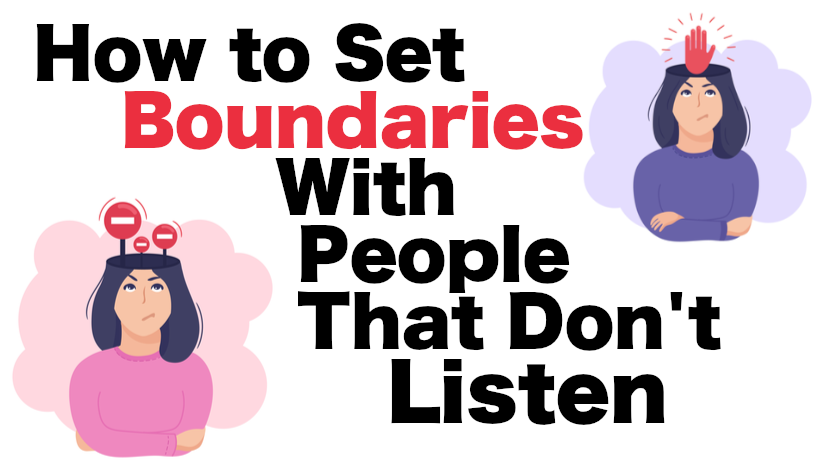Creating and enforcing boundaries for others and ourselves is key to a healthy and happy life. Sometimes, some people repeatedly violate our boundaries (either on purpose or by accident). This may mean that they do not respect you as an individual to go along with your boundaries. In this article, you will find key ways to build your boundaries (if you haven’t done so already) as well as learn how to deal with those who do not respect your boundaries.
Ways to Build Your Boundary:
Know your limits by tuning into your emotions
You have to know where you stand with your limits. How much can you take? Dana Gionta, Ph.D. assures that you should tune into your feelings to know what your limits may be. A few signs, Gionta says, that we may be letting go of our boundaries happens when feelings of discomfort and resentment start to bubble up. She affirms that individuals should think about the discomfort on a scale from 1-10.
“When someone acts in a way that makes you feel uncomfortable, that’s a cue to us they may be violating or crossing a boundary,” Gionta said.
When setting your boundaries, be direct
Usually, in casual conversations, you can set a boundary without being too harsh or direct. However, this may not be the case with someone who may be taking advantage of you and who refuses to respect your boundaries. When this happens, make sure to be as direct as possible to avoid any confusion. Be aware of how the other person operates and tune your communication accordingly.
Don’t feel bad about setting boundaries
Give yourself permission to set boundaries. Feeling guilty for setting a boundary is a giant pitfall, says Gionta. “Boundaries are a sign of self-respect. So give yourself permission to set boundaries and work to preserve them,” Margarita Tartakovsky, M.S.says.
Start Small
It can be scary to set a boundary especially if you feel plagued by guilt and anxiety. Gionta says, “Build upon your success, and [at first] try not to take on something that feels overwhelming.”
How do I deal with someone who repeatedly violates my boundaries?
While there are a few things to consider as to why another individual is violating your boundaries (closeness of the relationship, power difference, the duration of violation and disrespect, if the violator is willing to change, etc), there may be a few tips you can do to deal with people who disrespect your boundaries.
Continue to Set Consistent Boundaries
This is the part that you can control. Make it known and clear to the other person that you have these boundaries. Repeat yourself if necessary until they adhere to the strict boundaries you have set. Let it be known what kind of treatment you are willing to accept (or deny) if they continue on this path. Be direct.
Look for any loopholes or weak spots in your responses
Sometimes we may think that we are being direct when it turns out that we are not. If they are not listening, write your responses and see if you can be clearer on any front. Nonetheless, the problem may not even be you or your responses, but the way that the violator chooses to respond. I want to cover all points here.
Accept the person cannot be changed
Some people will simply not respect your boundaries after all the effort that you have put in. This is not your fault and you have to accept that some things cannot be changed. Sharon Martin LCSW says, “You can choose to accept it or you can choose to disengage.” In a similar sense, Martin ensures that “Some people intentionally violate boundaries to hurt you, get a reaction out of you, and to exert control.” The only way to win this game is not to play it.
If anything else, cut off contact
If all else fails, cut off contact or limit interactions with the violator. If it’s a coworker, ask your manager if you can switch shifts. If it’s a creepy uncle, you may decide to stop going to family gatherings. Know that you are in control when you use this option.
Special Circumstances
As with any situation, there are special circumstances for setting boundaries with people who do not listen. Martin lists them below:
- You live with the boundary violator
- The boundary violator is in a position of authority.
- Others pressure you to stay or minimize your feelings or the harm you’ve experienced
- You love and care about the boundary violator.
While these are special circumstances, know that you will always have a few options available. You may be able to speak with a therapist about your feelings toward the violator, find friends who might be able to take you in if you currently live with the person who disrespects your boundaries, or you may be able to find a new job.
Sources:



